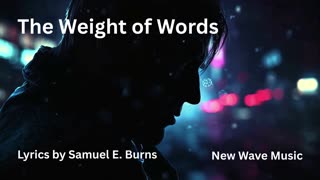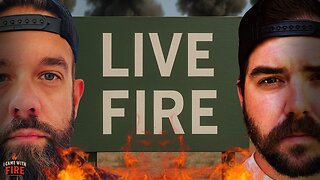Premium Only Content

"Weight of Words" by Samuel E. Burns
Samuel E. Burns’ "Weight of Words" is a poignant and introspective poem that captures the crushing pressure of responsibility, ambition, and the search for meaning in a fast-paced, urban world. Through vivid imagery and a rhythmic cadence, Burns paints a portrait of a protagonist—likely a journalist or editor—grappling with the relentless demands of their profession and the existential toll it takes on their soul.
The poem’s strength lies in its ability to weave the external chaos of the city with the internal turmoil of the speaker. Lines like “Papers pile up, / Deadlines approach, / Headlines are a burden, / With every new story” evoke a tangible sense of overwhelm, while the recurring motif of the pen as a “weight” symbolizes the burden of wielding words that shape narratives and lives. Burns masterfully uses this metaphor to explore the power and cost of language, suggesting that each word carries consequences that linger like “ink runs deep, / Like cracks in his skin.”
The thematic tension between ambition and authenticity is compelling. The speaker is torn between the allure of success—“A seat at the top”—and the moral compromises it demands: “He’d sell his soul, / For a rise to the top.” This internal conflict is universal, resonating with anyone who has faced the choice between integrity and advancement. The city, described as “indifferent and loud,” serves as a stark backdrop, amplifying the speaker’s isolation and the futility of their struggle to find connection or purpose.
Stylistically, the poem’s structure mirrors the speaker’s fractured state of mind. The short, staccato lines and fragmented thoughts reflect the relentless pace of their life, while the repetition of “Weight of words” as a refrain hammers home the central theme with haunting clarity. However, the poem occasionally leans on familiar imagery—city lights, smoke, and crowded streets—that risks feeling conventional. A touch more specificity in these descriptions could elevate the poem’s originality further.
Burns’ use of rhetorical questions, such as “Does it cost to stay, / Or can he leave?” and “Should he risk it all, / Or play it safe?” invites readers to ponder the speaker’s dilemma, making the poem an introspective mirror for our own choices. The lack of resolution in the closing lines—“Lost in a fog, / No one’s around. / Only the weight of words”—leaves a lingering sense of unease, reflecting the unresolved nature of the speaker’s struggle.
"Weight of Words" is a powerful meditation on the personal cost of ambition and the enduring impact of the words we choose to wield. Burns crafts a narrative that is both specific to the speaker’s experience and broadly relatable, making it a resonant piece for readers navigating their own burdens in a noisy, demanding world.
-
 2:49
2:49
New Wave Music
7 days ago"The Weight of Words" Lyrics by Samuel E. Burns
311 -
 2:04:27
2:04:27
TimcastIRL
7 hours agoAntifa CONVICTED Of TERRORISM, Fears Of CIVIL WAR Grow | Timcast IRL
227K71 -
 2:16:43
2:16:43
TheSaltyCracker
5 hours agoIt's Over Zelensky ReeEEStream 11-21-25
64.3K124 -
 LIVE
LIVE
Drew Hernandez
22 hours agoMIKE HUCKABEE EXPOSED FOR OFF RECORD MEETING WITH CONVICTED ISRAELI SPY?
1,169 watching -
 LIVE
LIVE
SynthTrax & DJ Cheezus Livestreams
15 hours agoFriday Night Synthwave 80s 90s Electronica and more DJ MIX Livestream SYNTHWAVE / ANIME NIGHT
227 watching -
 14:25
14:25
Tactical Advisor
13 hours agoReal Life John Wick Suit | Grayman & Company
16.8K2 -
 LIVE
LIVE
I_Came_With_Fire_Podcast
13 hours agoAlien Enemies Act | Dismantling the Department of Education | Valhalla VFT & America First
266 watching -
 19:53
19:53
MetatronHistory
4 hours agoRome VS Greece - Ultimate Clash of Civilizations Explained
7.74K4 -
 33:09
33:09
Exploring With Nug
6 hours ago $4.47 earnedThey Weren’t Ready for Nightfall on Blood Mountain… So I Helped Them Down
29.8K1 -
 1:16:42
1:16:42
Sarah Westall
4 hours agoBoardroom and Government Infiltration: The Silent Erosion of American Power w/ Mike Harris
18.2K4